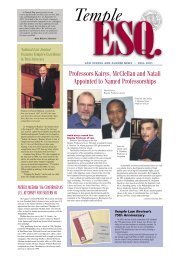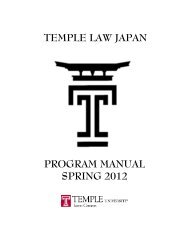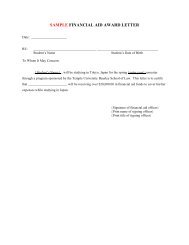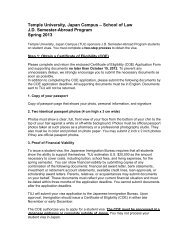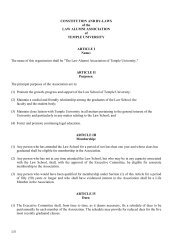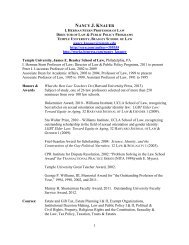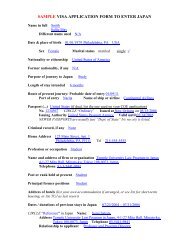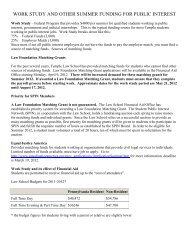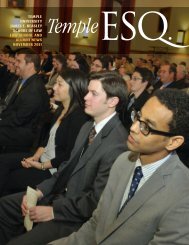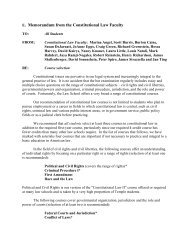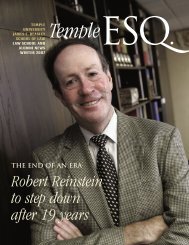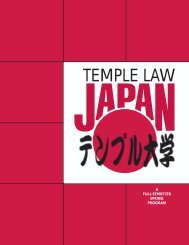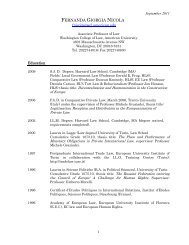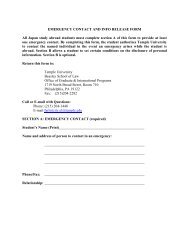Trial Advocacy Program Receives National Award - Temple Law ...
Trial Advocacy Program Receives National Award - Temple Law ...
Trial Advocacy Program Receives National Award - Temple Law ...
Create successful ePaper yourself
Turn your PDF publications into a flip-book with our unique Google optimized e-Paper software.
Professor Knauer<br />
Named Top Teacher<br />
by University<br />
“Always interesting and<br />
entertaining.”<br />
Professor Nancy J. Knauer was named one of<br />
only three <strong>Temple</strong> University Great Teachers.<br />
Presented annually since 1988, the Great Teacher<br />
award is the University’s highest honor.<br />
Consistently praised by students and<br />
colleagues, Knauer teaches popular courses on<br />
property, trusts and estates, taxation, estate<br />
planning, tax policy, and sexual orientation and<br />
the law. These challenging subjects include<br />
technical areas of law with which most students<br />
have little familiarity. Using a mix of lively class<br />
discussions, skillful presentations, real life<br />
examples and illustrations, and large doses of<br />
humor, Knauer keeps students interested in<br />
courses that might otherwise be dry.<br />
“Nancy is an extraordinarily gifted lawyer and<br />
teacher,” says Associate Dean Mark Rahdert, chair<br />
of the law school committee that nominated<br />
Knauer for the award. “The student acclaim is<br />
universal and runs the full gamut of her courses,<br />
from writing seminars to technical trusts and<br />
estates. This recognition is richly-deserved.”<br />
Knauer has twice received the George P.<br />
William Memorial <strong>Award</strong>, the law school’s highest<br />
teaching honor, in 1994 and 1998. In February,<br />
she and Professor Eleanor Myers received the<br />
CPR Institute’s inaugural prize for Problem<br />
Solving in the <strong>Law</strong> School Curriculum for their<br />
course on integrated transactional practice (see<br />
article on page two.)<br />
Knauer, who has taught at the law school since<br />
1991, is legendary for her thoroughness and<br />
grasp of diverse material, as well as her ability<br />
to entertain. Student evaluations often include<br />
statements like “10 out of 10 if not better,” “11<br />
out of 10” or “A++.” One student’s comments sum<br />
up the attitude of the vast majority of students in<br />
her popular class in property: “Always interesting<br />
and entertaining.” A student in Knauer’s tax class<br />
comments that she “breathes life into tax,” while<br />
another admits the class is “one of the best in the<br />
law school, and I don’t even like tax!”<br />
In addition to classroom teaching, Knauer<br />
regularly volunteers to mentor students<br />
experiencing academic difficulties, and works<br />
closely with students in extracurricular settings.<br />
As faculty adviser to the <strong>Temple</strong> Political & Civil<br />
Rights <strong>Law</strong> Review, she helps the student editors<br />
develop annual symposia discussing emerging<br />
civil rights issues. And as adviser to <strong>Temple</strong><br />
<strong>Law</strong> Students for Lesbian and Gay Rights,<br />
Knauer helped develop a Queer Theory discussion<br />
group as well as a series of faculty colloquia<br />
high-lighting concerns of gays and lesbians in<br />
the classroom.<br />
Knauer joined <strong>Temple</strong> <strong>Law</strong> School as an<br />
assistant professor in 1991, after working at<br />
Ballard Spahr Andrews & Ingersoll for seven<br />
years. She is now a full professor. A resident<br />
of the West Mount Airy section of Philadelphia,<br />
Knauer earned her undergraduate and law degrees<br />
at the University of Pennsylvania.<br />
JOSEPH LABOLITO<br />
<strong>Temple</strong><br />
ESQ.<br />
REAL<br />
WORLD. REAL LAW.<br />
LAW SCHOOL AND ALUMNI NEWS • SUMMER 2002<br />
<strong>Trial</strong> <strong>Advocacy</strong> <strong>Program</strong><br />
<strong>Receives</strong> <strong>National</strong> <strong>Award</strong><br />
<strong>Temple</strong> is first school to win prestigious Gumpert <strong>Award</strong> twice<br />
Once again, <strong>Temple</strong>’s<br />
trial advocacy program<br />
has won national<br />
recognition. The<br />
American College of<br />
<strong>Trial</strong> <strong>Law</strong>yers has<br />
awarded <strong>Temple</strong><br />
University Beasley<br />
School of <strong>Law</strong> the 2002<br />
Emil Gumpert <strong>Award</strong> for<br />
excellence in teaching<br />
trial advocacy. The<br />
award includes a<br />
$50,000 donation to<br />
the law school.<br />
“The trial advocacy<br />
program has brought a<br />
great deal of honor and<br />
recognition to the law<br />
school, and truly<br />
exemplifies our ‘real world—real law’ philosophy,”<br />
says Dean Robert J. Reinstein.<br />
<strong>Temple</strong> is the first school to have won twice in the<br />
award’s 25-year history. When Dean Robert Reinstein<br />
accepted the first award in 1989, he noted that along<br />
with the celebration of institutional vitality, there was<br />
the opportunity to recommit to ideals and values and<br />
to use the forward momentum to evaluate the future of<br />
the program.<br />
In the eleven years that followed, the law school has<br />
enhanced its trial advocacy program with the following<br />
offerings:<br />
• A two-semester program which integrates trial<br />
advocacy, evidence and professional responsibility.<br />
<strong>Temple</strong>’s curriculum for this integrated program has<br />
become a model for teaching evidentiary rules and<br />
ethical precepts through simulation of the courtroom<br />
experience (see article on page three.)<br />
• Two advanced trial advocacy tracks—criminal and<br />
civil—in which students are challenged by the<br />
complexities of specialized practice, confronted<br />
with “real world” experts, and called upon to use<br />
technology in simulated courtrooms.<br />
• An LL.M. degree in trial advocacy, the first and<br />
only masters of law degree program in the country<br />
dedicated to the academic advancement of and<br />
skill training for practicing trial lawyers.<br />
• An interscholastic national trial team program<br />
which gives selected students the chance to try<br />
“cases” regionally and nationally before panels of<br />
accomplished trial lawyers and judges and creates an<br />
unparalleled standard for excellence in advocacy.<br />
Professor Edward Ohlbaum, Director of <strong>Trial</strong><br />
<strong>Advocacy</strong> and Clinical Legal Education, as well as<br />
co-coach of the trial team, has long been the linchpin<br />
of trial advocacy at <strong>Temple</strong>. He describes the success<br />
of the program: “It is neither boast nor brag to report<br />
that <strong>Temple</strong> trains trial lawyers. In our trial advocacy<br />
program students are taught how to ask questions<br />
and make speeches, and how to practice those skills<br />
Professor Edward D. Ohlbaum (left) and Dean Robert J.<br />
Reinstein (right) accept the Emil Gumpert <strong>Award</strong> from<br />
Stuart D. Shanor, President of the American College of<br />
<strong>Trial</strong> <strong>Law</strong>yers.<br />
nourished by the very<br />
heart of trial<br />
advocacy—the<br />
case theory.<br />
“At <strong>Temple</strong>, trial<br />
advocacy is not a<br />
sideline; it’s a<br />
discipline.”<br />
For three<br />
consecutive years<br />
starting in 1999,<br />
<strong>Temple</strong>’s trial<br />
advocacy program<br />
was ranked by US<br />
News and World<br />
Report’s national poll<br />
as the top ranked trial<br />
advocacy program<br />
among law schools.<br />
This year <strong>Temple</strong><br />
shares the honor with Stetson <strong>Law</strong> School.<br />
<strong>Trial</strong> team sets the standard<br />
The trial team, which Ohlbaum calls “the centerpiece<br />
of the program,” has won the most national<br />
competitions of any law school since 1985. “Although<br />
only fourteen students are eligible to compete each<br />
year in interscholastic competition, the team sets the<br />
standard of excellence in technique and professionalism<br />
that has become the benchmark for performance,”<br />
says Ohlbaum.<br />
“It sets the standards for which our students shoot,<br />
it provides the bar which our teachers demand that our<br />
students reach. It provides the measure by which we<br />
self-evaluate, and it makes us at <strong>Temple</strong> all walk a little<br />
taller and try a little harder to maintain the number one<br />
ranking we have worked hard to earn.”<br />
In 2000-2001, <strong>Temple</strong> won the ATLA national<br />
championship for the second time in four years. In<br />
the <strong>National</strong> <strong>Trial</strong> Competition, the “Super Bowl of<br />
tournaments,” the school has been to the final four eight<br />
times in the last eleven years, finishing first in 1999,<br />
1998 and 1995, and second in 1993 and 1992.<br />
<strong>Trial</strong> advocacy is taught throughout the<br />
J.D. curriculum<br />
<strong>Advocacy</strong> skills training begins during the first<br />
semester of the first year with legal writing and research<br />
courses. Students are taught the fundamentals of legal<br />
analysis through repeated exercises in library research<br />
and the preparation of office memoranda and an<br />
appellate brief which must be defended in oral argument<br />
before a moot court.<br />
During the second year, students are eligible to take<br />
other courses in the advocacy curriculum: the integrated<br />
program in trial advocacy or the basic introduction to<br />
trial advocacy.<br />
Armed with these prerequisites, students are eligible<br />
to enter the clinical program where they select from<br />
continued on page three<br />
TEMPLE UNIVERSITY BEASLEY SCHOOL OF LAW
Comments from Joey Passon’s Colleagues<br />
Professor Emeritus Joseph W. Marshall ’54<br />
“I first knew Professor Passon as a student, and<br />
then later as a colleague. There was probably never<br />
a new young law school faculty member who was<br />
called upon to teach a greater variety of courses<br />
than Joe. It was unbelievable. He worked so hard at<br />
all of it and he did so well.”<br />
Professor Emeritus Donald R. Price ’66<br />
“He’s one of the sweetest guys who ever walked<br />
the face of the earth—a very generous, humane<br />
guy. We formed our bond in law school when we<br />
started together in 1962. I always felt the students<br />
enjoyed him and he was certainly a great faculty<br />
colleague.<br />
“Joey always cared about<br />
<strong>Temple</strong>—<strong>Temple</strong> through<br />
and through.”<br />
Professor Emeritus Gerald F.<br />
Tietz ’70<br />
“Thirty-five years ago, Joey<br />
taught me that tort law protects<br />
the dignitary interests of people.<br />
When I joined the faculty fifteen<br />
years later, I experienced his<br />
generous support of new faculty<br />
members. Joey was a true friend<br />
and generous colleague, a<br />
dedicated and respectful teacher, whose calming<br />
presence and patient consideration set a standard<br />
worthy of emulation.”<br />
Professor Carl E. Singley ’72<br />
“Joe was one of the first teachers I met when<br />
I came to <strong>Temple</strong> <strong>Law</strong> School in 1968. He worked<br />
very closely with the new group of African-<br />
American law students who started law school<br />
together. Those of us who were first-year law<br />
students—and certainly the minority students—<br />
loved Joe Passon. He worked countless hours<br />
with us, spent a lot of office time on developing<br />
study habits and learning the material. A lot of<br />
us who started then probably would not have<br />
gotten through law school without Joe Passon.<br />
Joey, probably more than any other person,<br />
epitomizes the notion of <strong>Temple</strong> as a wonderful<br />
teaching institution.”<br />
SOUTH AFRICAN JUSTICE ADDRESSES THE ROLE<br />
OF INTERNATIONAL CRIMINAL LAW IN THE<br />
PROSECUTION OF WAR CRIMES<br />
Justice Richard Goldstone visits <strong>Temple</strong> <strong>Law</strong> School<br />
On April 23, 2002, the <strong>Temple</strong> Institute for<br />
International <strong>Law</strong> and Public Policy hosted Justice<br />
Richard J. Goldstone, an internationally-respected jurist<br />
of the Constitutional Court of South Africa.<br />
Justice Goldstone spoke about the role of<br />
international criminal law in the prosecution of war<br />
crimes. His speech was especially relevant not only<br />
since September 11th, but also due to the United<br />
Nations’ announcement on April 11 that the treaty<br />
creating the world’s first permanent war crimes tribunal<br />
will come into force this summer.<br />
A high-profile human rights advocate, Justice<br />
Goldstone was the first chief prosecutor of the<br />
International Criminal Tribunals for the former<br />
Yugoslavia and Rwanda (1994-1996). Previously,<br />
Justice Goldstone played a critical role in two of the<br />
most important legal responses to human rights abuses<br />
of our time, chairing a Commission of Inquiry into<br />
political violence in South Africa (the Goldstone<br />
Commission) and actively guiding South Africa’s<br />
transition into the post-apartheid era. In addition to<br />
his position on South Africa’s Constitutional Court,<br />
Goldstone currently chairs the Independent<br />
International Commission on Kosovo and serves<br />
as Chancellor of the University of Witwatersrand.<br />
2 • TEMPLE ESQ. SUMMER 2002<br />
Professor Richard K. Greenstein, LL.M. ’82<br />
“Besides his unfailing warmth and generosity,<br />
two things stand out in my mind about Joey.<br />
One is his utter devotion to the <strong>Law</strong> School’s<br />
graduate teaching fellowship program. Year after<br />
year Joey spent countless hours on the phone,<br />
talking with the chairs of faculty selection<br />
committees in law schools around the country,<br />
arranging “matches” between schools and the<br />
teaching fellows. Generations of graduates of our<br />
program literally owe their careers in the legal<br />
academy to Joey’s tireless efforts. The second<br />
thing is that Joey is exceptionally thoughtful on<br />
the subject of legal education.”<br />
Professor Sharon S. Harzenski ’74<br />
“Joey is a much-loved friend and colleague.<br />
One story about him that I’d like to share<br />
concerns our travels together in Ghana during the<br />
summer session abroad there. Joey brought with<br />
him his wife and his daughter and I was traveling<br />
with my son. We would all pile into a Volkswagen<br />
and visit nearby towns, markets, historical sites,<br />
beaches. Whenever and wherever we stopped and<br />
unloaded from that little car, people would<br />
mistake us for a single family: A man traveling<br />
with his wives and his children. This family saga<br />
is one of my favorite memories.”<br />
Professor Laura E. Little ’85<br />
“One of the things that makes <strong>Temple</strong> <strong>Law</strong><br />
School special is that people on the faculty truly<br />
care about the institution. Joey symbolizes that<br />
ethic in a very deep way.”<br />
“Justice Goldstone is an<br />
outstanding individual and lawyer,”<br />
says Jeffrey Dunoff, co-director of<br />
the <strong>Temple</strong> Institute for International<br />
<strong>Law</strong> and Public Policy. “We are<br />
thrilled to welcome him and to offer our students<br />
the opportunity to hear his perspectives, especially<br />
during such a critical time in the development of<br />
international law.”<br />
The <strong>Temple</strong> Institute for International <strong>Law</strong> and Public<br />
Policy was created by law school faculty working in the<br />
areas of international and comparative law, and is run by<br />
Professors Amelia H. Boss and Jeffrey L. Dunoff. The<br />
purpose of the new institute is to provide a focus for the<br />
law school’s existing strengths in the international law<br />
area, enhance the wide range of international and<br />
comparative law activities already at the law school, and<br />
strengthen the international legal training the law school<br />
provides its students. One way it does so is by hosting a<br />
series of distinguished speakers and scholars-in-residence.<br />
Other visitors hosted by the institute in the 2001-2002<br />
academic year were Justice Cao Jianming, Supreme<br />
People’s Court of China; Professor Hillary Charlesworth,<br />
Australia <strong>National</strong> University; Professor Diego Corapi,<br />
University of Rome; and Justice Itsuo Sonobe, Supreme<br />
Court of Japan.<br />
Professor Joey<br />
Passon ’65 Retires<br />
Professor Joey Passon—who first came<br />
to <strong>Temple</strong> as an undergraduate in 1958—<br />
will become professor emeritus on July 1.<br />
The soft-spoken Passon did not want to<br />
end his 36 years as a <strong>Temple</strong> <strong>Law</strong> teacher<br />
with a formal ceremony. Instead, students,<br />
friends and colleagues surprised him with<br />
an informal gathering after his last class.<br />
Passon is noted for his skill and devotion as a<br />
teacher and for his service to the <strong>Law</strong> School. Over<br />
the years, he headed many committees, including the<br />
centennial and tenure committees. In 1983, he became<br />
director of the law school’s innovative program to<br />
train graduate teaching fellows. That same year<br />
Passon initiated ongoing legal education seminars and<br />
faculty workshops.<br />
During the 1970s, Passon served as assistant dean of<br />
academic affairs, associate dean for student affairs and<br />
director of the <strong>Temple</strong> summer session abroad in Ghana—<br />
the last session before the country fell into hostile hands.<br />
Along the way, Passon has received several Universitywide<br />
awards. They include the 1997 Stauffer <strong>Award</strong> for<br />
outstanding faculty service and the 1991 Lindback <strong>Award</strong><br />
for distinguished teaching.<br />
“I love teaching and I love being with the students,”<br />
Passon says. “But for me, the most significant part was<br />
helping to build a law school that really represented what<br />
this country looks like in terms of diversity.”<br />
Passon, who currently lives in Florida with his wife<br />
Toni, now devotes his time to family, books and golf.<br />
—Janet Blom Shea<br />
Justice Richard Goldstone (right), with Professor<br />
Jeffrey Dunoff (left) and Jeffrey Reiff ’79 (center),<br />
was one of five visiting scholars hosted by the <strong>Temple</strong><br />
Institute for International <strong>Law</strong> and Public Policy.<br />
TEMPLE ESQ.<br />
Published by the <strong>Temple</strong> University<br />
Beasley School of <strong>Law</strong> for alumni and friends.<br />
Robert J. Reinstein, Dean<br />
Janet Goldwater, Publications Director<br />
Gene Gilroy, Art Director<br />
Photography on location at <strong>Temple</strong><br />
<strong>Law</strong> School by Kelly & Massa<br />
Send letters and comments to:<br />
Janet Goldwater, <strong>Temple</strong> Esq.<br />
<strong>Temple</strong> University James E. Beasley School of <strong>Law</strong><br />
1719 N. Broad Street, Room 313<br />
Philadelphia, PA 19122<br />
Telefax: (215) 204-1185<br />
Change of Address: (215) 204-1187
<strong>Temple</strong> <strong>Law</strong> Faculty Honored for<br />
Problem Solving Curriculum<br />
Professors Knauer and Myers developed the course for<br />
the Integrated Transactional <strong>Program</strong><br />
Professor Nancy J.<br />
Knauer and Associate<br />
Professor Eleanor W.<br />
Myers were awarded<br />
the inaugural<br />
“Problem Solving<br />
in the <strong>Law</strong> School<br />
Curriculum <strong>Award</strong>”<br />
by the CPR Institute<br />
for Dispute<br />
Resolution.<br />
The award is<br />
given in recognition<br />
of the excellence<br />
of the innovative<br />
curriculum Knauer<br />
and Myers have<br />
developed for the law<br />
school’s Integrated<br />
Transactional<br />
<strong>Program</strong>. Courses at<br />
Columbia and<br />
Stanford law schools<br />
were awarded honorable mention.<br />
TRIAL ADVOCACY AWARD<br />
continued from page one<br />
Professors Nancy J. Knauer and Eleanor W. Myers at the<br />
New York City awards dinner of The CPR Institute for<br />
Dispute Resolution.<br />
The CPR Institute for Dispute Resolution is an<br />
alliance of 500 major corporations, law firms and<br />
outstanding academics at the forefront of resolving<br />
business and public disputes through mediation and<br />
other forms of dispute resolution.<br />
<strong>Temple</strong>’s Integrated Transactional <strong>Program</strong> is a yearlong<br />
course that combines the teaching of professional<br />
responsibility, trusts and estates, interviewing,<br />
counseling, negotiating, and drafting with actual<br />
practice. While studying the theory of these courses,<br />
students are separated into teams and work with each<br />
other to close a series of simulated transactions, facing<br />
numerous legal problems and ethical challenges<br />
throughout the exercises.<br />
In one case, students are asked by a mother to draft a<br />
pre-nuptial agreement for her son, who does not want<br />
the contract. “The students must protect the interests of<br />
their client while being sensitive to the needs of the son,<br />
who will refuse to sign a hard-nosed agreement,”<br />
explains Knauer. “Drafting the contract under these<br />
pressures gives the students a glimpse of what practicing<br />
law is really like.”<br />
among a diverse range of lawyering venues, including<br />
eighteen which focus on litigation or trial-oriented areas.<br />
In the current academic year, the 25 clinical courses<br />
provide almost 375 student slots. Approximately 75<br />
percent of day division students take at least one clinical<br />
course—many will take more.<br />
The use of technology enhances trial skills<br />
<strong>Temple</strong> <strong>Law</strong> School is moving from a “fully wired”<br />
approach to a new “anytime, anywhere” philosophy<br />
which tailors wired and wireless networks to give the<br />
law school community maximum flexibility.<br />
During the academic year 2000-2001, the trial<br />
advocacy program implemented perhaps the most<br />
exciting use of the available technology. A pilot project<br />
with digital files and video streaming allows trial<br />
advocacy students to view themselves live on computer<br />
in the privacy of a computer lab or home.<br />
In traditional video review of trial techniques, a<br />
student is critiqued in class and then immediately leaves<br />
the class with tape in hand to meet a different instructor<br />
who works with the advocate based on a review of the<br />
tape. The law school’s new program makes use of the<br />
technology of converting analog video files to digital<br />
files which are then uploaded onto the internet and<br />
accessed, along with a simultaneous review, by students<br />
at home or at a later time.<br />
With many innovative plans in the works, the law<br />
school will use the $50,000 which accompanies the Emil<br />
Gumpert <strong>Award</strong> to fulfill its ambition to further<br />
incorporate technology into legal education.<br />
Myers adds,<br />
“This course teaches<br />
students that it’s not<br />
the law that is hard,<br />
it’s effectively<br />
dealing with the<br />
various personalities<br />
and emotions<br />
involved that is<br />
most difficult.”<br />
In another case,<br />
students negotiate a<br />
complex sale of a<br />
business over six<br />
weeks, encountering<br />
objections from<br />
employees and other<br />
roadblocks along<br />
the way.<br />
Criteria for the<br />
award include<br />
innovation in<br />
teaching problem<br />
solving; substantive and pedagogical strength; and the<br />
ability to be adapted by other law schools. The course<br />
was also recognized for its emphasis on the ethical<br />
dimension of legal practice.<br />
Development of the Integrated Transactional <strong>Program</strong><br />
was underwritten by the Department of Education and<br />
the American College of Trusts and Estates Council, and<br />
course materials were published by the <strong>National</strong><br />
Institute of <strong>Trial</strong> <strong>Advocacy</strong>.<br />
NEW DIRECTOR FOR<br />
TEMPLE LAW IN JAPAN<br />
Professor<br />
<strong>Law</strong>rence Repeta<br />
is the new<br />
director of the<br />
J.D. and LL.M.<br />
programs at<br />
<strong>Temple</strong> University<br />
<strong>Law</strong> <strong>Program</strong><br />
in Japan. Repeta<br />
is an expert on<br />
government<br />
information<br />
disclosure<br />
systems and is<br />
well-known for<br />
his participation<br />
in the groundbreaking<br />
Supreme<br />
Professor <strong>Law</strong>rence Repeta Court case,<br />
Repeta vs. Japan,<br />
which established the right of observers to take notes<br />
during court proceedings in Japan.<br />
Prior to joining <strong>Temple</strong>, Repeta practiced law in<br />
Seattle and Tokyo and was an executive in the financial<br />
services industry in Tokyo. From 1992 through 1996, he<br />
served as the president of Frank Russell Japan. He is a<br />
1979 graduate of University of Washington School of<br />
<strong>Law</strong> and is a director of the Japan Civil Liberties Union<br />
and Information Clearinghouse Japan, two non-profit<br />
organizations that advocate the protection of<br />
fundamental human rights and the public right to know.<br />
His research has been supported by grants from the<br />
Japan Foundation and the US-Japan Friendship<br />
Commission and he has authored numerous articles on<br />
legal and business issues in Japan.<br />
<strong>Temple</strong> <strong>Law</strong>’s program in Japan, established in 1994,<br />
remains the only ABA-approved semester abroard<br />
program for American J.D. students in Asia. Students<br />
can also earn credits toward two master of laws<br />
programs at the Tokyo campus.<br />
PROSECUTION OF WAR CRIMES<br />
IS NEW RESEARCH AREA FOR<br />
PROFESSOR LAURA E. LITTLE<br />
<strong>Award</strong>-winning Professor Laura E. Little ’85<br />
has been writing, researching and speaking on<br />
the process of judging and decision-making since<br />
joining <strong>Temple</strong> <strong>Law</strong>’s faculty in 1990.<br />
Those interests have now gone international.<br />
Last summer Little and her husband, Richard P.<br />
Barrett ’85, co-taught a course in International<br />
Criminal <strong>Law</strong> at the <strong>Law</strong> School’s summer<br />
session in Rome, Italy.<br />
Barrett, an assistant U.S. attorney for the<br />
Eastern District of Pennsylvania, is a transnational<br />
and domestic prosecutor, prosecuting criminals in<br />
other countries under United States domestic law.<br />
“He taught the part of the course dealing with<br />
procedures for prosecuting,” Little says. “I taught<br />
the part of the course dealing with the appropriate<br />
court to use for prosecuting war criminals.”<br />
Their coauthored article, “Yugoslav Rape<br />
Convictions and Acquittals: A Greater Role for<br />
Conspiracy <strong>Law</strong> in International Tribunals,” is<br />
in progress.<br />
Little, who specializes in federal courts,<br />
civil procedure, remedies, conflict of laws and<br />
international criminal law, studies the process of<br />
judging and decision-making from a number of<br />
different angles.<br />
One angle is “the role of emotion in<br />
adjudication,” she says. “I’ve looked at loyalty and<br />
gratitude—at jealousy and envy—and also started<br />
to study general theories of emotion both in<br />
philosophy and psychology to evaluate how it<br />
affects decision-making.” Her essay on general<br />
emotion theories, entitled “Negotiating the Tangle<br />
of <strong>Law</strong> and Emotion,” appears in the Cornell <strong>Law</strong><br />
Review. A recent presentation on adjudication<br />
and emotion before the International Therapeutic<br />
Jurisprudence Symposium will soon appear in<br />
print as well.<br />
“Another angle I’ve used is the study of<br />
language used in judicial opinions,” Little says.<br />
She will discuss legal language before the<br />
Pennsylvania Superior Court in June as part of<br />
her ongoing presentations before federal courts<br />
throughout the country.<br />
Little’s article, “The ABA’s Role in Prescreening<br />
Federal Judicial Candidates: Are we Ready to<br />
Give up on the <strong>Law</strong>yers?” appeared as part of a<br />
symposium in William and Mary Bill of Rights<br />
Journal in December 2001.<br />
Recently, Little discussed President Bush’s<br />
decision to create military tribunals for prosecution<br />
of the September 11 terrorists at the <strong>Law</strong><br />
School’s new Institute on International <strong>Law</strong><br />
and Public Policy.<br />
Little’s activity in the legal world has not<br />
distracted her from the classroom: in 2000 she<br />
was awarded the Lindback <strong>Award</strong> for distinguished<br />
teaching and received the George P. Williams III<br />
Memorial <strong>Award</strong> for excellence as a teacher<br />
awarded by the 1993, 1997 and 2001 graduating<br />
classes. In 1995 she received the Friel-Scanlon<br />
Prize for outstanding scholarship.<br />
She and Barrett are the parents of two children,<br />
Caitlin, 11, and Graham, 9.<br />
— Janet Blom Shea<br />
TEMPLE ESQ. SUMMER 2002 • 3
Arnold Glaberson ’65<br />
donated a classroom in<br />
memory of his daughter,<br />
Sandra Glaberson.<br />
2002 ANNUAL WOMEN’S<br />
LAW CAUCUS DINNER<br />
4 • TEMPLE ESQ. SUMMER 2002<br />
Lies in Alumni Generosity<br />
College Hall was constructed on North Broad Street in 1893 as the original<br />
classroom building for <strong>Temple</strong> College. In 2000, Leonard Barrack ’68 and his wife<br />
Lynne Barrack made the generous decision to revitalize the building, this time as a part<br />
of the law school.<br />
Since reopening its doors in 2002 as Morris & Sylvia Barrack Hall, the building has<br />
become an integral part of life at the law school. Other major gifts have contributed to<br />
Barrack Hall’s success as a first-class facility for legal education:<br />
Abraham Bauer & Spaulding, for a seminar room;<br />
Angstreich Finney Bauer & Spaulding, for a seminar room;<br />
Blank Rome Comisky & McCauley, for a seminar room;<br />
Robert C. Daniels ’62, for the Admissions Office lobby;<br />
The Ellers Family, for the chancellor’s office;<br />
Raymond P. Forceno ’64, for a classroom;<br />
Arnold Glaberson ’65, for a classroom;<br />
Joseph H. Hennessey ’72, for a seminar room;<br />
Arthur G. Raynes ’59, for a lecture hall;<br />
Robert A. Rovner, for the Student Bar Association office;<br />
<strong>Temple</strong> <strong>Law</strong> Alumni Association, for the student lounge; and<br />
Arthur A. Wolk ’68, for a lecture hall.<br />
BARRACK HALLSuccess of Barrack Hall<br />
Janice Kaguyutan ’97 (shown<br />
with Dean Robert J. Reinstein)<br />
was the speaker at the 2002<br />
Women’s <strong>Law</strong> Caucus dinner,<br />
held March 21 at Shusterman<br />
Hall. Kaguyutan is staff attorney<br />
for the <strong>National</strong> Organization<br />
for Women Legal Defense and<br />
Education Fund.<br />
Edward Ellers ’76, with his son Spence<br />
and wife Elizabeth Wallace-Ellers,<br />
contributed the Chancellor’s Office on<br />
the third floor (office shown at left).<br />
Raymond P. Forceno ’64<br />
donated a classroom in<br />
honor of his father,<br />
Peter Forceno.<br />
Leonard ’68 and<br />
Lynne Barrack are<br />
shown in front of a<br />
plaque depicting<br />
Leonard’s parents,<br />
Morris and Sylvia<br />
Barrack.<br />
Joseph H. Hennessey ’72 with his wife Alice in the Joseph H.<br />
Hennessey seminar room.<br />
Arthur A. Wolk ’68 is shown in the fully “wired” Arthur A. Wolk<br />
lecture hall.<br />
Cara Garvey<br />
was presented<br />
the 2002 Evelyn<br />
M. Trommer<br />
Scholarship by<br />
Associate Dean<br />
Mark M. Rahdert<br />
at the March 21<br />
annual dinner of<br />
the Women’s <strong>Law</strong><br />
Caucus. Created<br />
by a gift from the<br />
estate of Judge<br />
Evelyn M.<br />
Trommer ’39, the scholarship is given to a law<br />
student, with preference to evening division<br />
students who are members of the Women’s<br />
<strong>Law</strong> Caucus.
CLASS NOTES<br />
such appointment for Ziccardi, a retired Colonel in the<br />
U.S. Army Reserve. This voluntary position provides the<br />
media, local governments, and the public with<br />
information and clarification of Army policies.<br />
1972<br />
Robert G. Fryling, a partner in the business and<br />
corporate department of Blank Rome Comisky &<br />
McCauley, has been elected to the board of directors of<br />
the American Civil Liberties Union of Philadelphia.<br />
Fryling concentrates his practice in providing advice on<br />
all aspects of public contract law.<br />
1973<br />
1974<br />
1975<br />
1954<br />
Louis C. Bechtle, a partner at<br />
Conrad O’Brien Gellman &<br />
Rohn, participated in a<br />
multidistrict litigation judicial<br />
panel discussion sponsored by<br />
the Product Liability Advisory<br />
Council. Bechtle, was appointed<br />
by Chief Justice Rehnquist<br />
while serving as a federal judge<br />
for the United States District<br />
Court for the Eastern District of<br />
Pennsylvania.<br />
1958<br />
Edward Blumstein is treasurer<br />
and a board member of the Penn<br />
Council for Relationships<br />
(formerly the Marriage Council<br />
of Philadelphia and soon to be<br />
the Council for Relationships).<br />
Blumstein also serves on the<br />
board of the Volunteer for the<br />
Indigent <strong>Program</strong> (VIP) of the<br />
Philadelphia Bar Association,<br />
and chairs the family section’s<br />
ethics committee for the<br />
Association for Conflict<br />
Resolution, an international<br />
association based in<br />
Washington.<br />
Joseph S.<br />
Ziccardi<br />
has been<br />
reappointed<br />
civilian aide to<br />
the Secretary<br />
of the Army<br />
for eastern<br />
Pennsylvania. This is the fourth<br />
Robert Hanna Jr. of Marshall,<br />
Dennehey, Warner, Coleman & Goggin<br />
presented an in-house seminar on<br />
employment law, federal civil rights<br />
liability, and the Pennsylvania<br />
Subdivision Tort Claims Act to the<br />
adjusters of Coregis Insurance Company<br />
in Chicago.<br />
Eric Weiss of Marshall, Dennehey,<br />
Warner, Coleman & Goggin has been<br />
appointed chair of the Federation of<br />
Defense and Corporate Counsel’s<br />
products liability section.<br />
Mark J. Blaskey recently joined the Philadelphia<br />
office of Pepper Hamilton. He was previously chair of<br />
Cozen O’Connor’s estate panning and administration<br />
department.<br />
BLSA HOSTS ANNUAL RECEPTION<br />
Dean Robert J. Reinstein (left) congratulates<br />
Joe Tucker Jr. on being the recipient of this<br />
year’s BLSA Alumni <strong>Award</strong>.<br />
ESQ. SPOTLIGHT<br />
Anthony Clark ’79<br />
Skadden Arps partner took the ‘long road’ to law school<br />
What do driving a taxi, working as a roughneck<br />
on an oil rig and manning a security booth have<br />
to do with preparing for a career in the law?<br />
Everything, according to Anthony W. Clark ’79,<br />
who says that an unlikely combination of<br />
experiences helped him to find his way to a<br />
challenging career in corporate<br />
litigation. Clark, now a partner<br />
in the Wilmington, Delaware,<br />
office of Skadden, Arps, Slate,<br />
Meagher & Flom may have<br />
taken the long road to the<br />
practice of law, but he has<br />
enjoyed every minute of it.<br />
Clark was raised in upstate<br />
New York and earned his<br />
undergraduate degree from the<br />
State University of New York at<br />
Cortland in 1973. An English<br />
major, it was only natural that he<br />
devote a few years to what he<br />
facetiously calls his “Jack<br />
Kerouac time.” So after<br />
graduation, he went “on the<br />
road,” spending his first summer<br />
after graduation on Puget Sound,<br />
mostly watching the Watergate hearings on<br />
television. But when the summer ended, and the<br />
typical rains of the Northwest winter loomed, he<br />
packed up again and headed for Florida, where he<br />
drove a taxi and worked in a car wash.<br />
With the country in a deep recession, he headed<br />
to the Longhorn State, where the oil business was<br />
booming. His next stop was Kermit, Texas. “I got a<br />
job as a roughneck,” says Clark. “I was low man on<br />
the totem pole on an oil well drilling crew. It was<br />
hard work, but a great experience.”<br />
Since college, Clark had considered going to law<br />
school. Still toying with the idea, he decided it was<br />
time to leave the oil fields of West Texas and satisfy<br />
his curiosity about a career in the law. With jobs at<br />
law firms scarce, he needed to find a creative way to<br />
get some firsthand experience in the field. So he<br />
volunteered for VISTA, requesting a post in a legal<br />
services office. Clark was placed in Camden, New<br />
Jersey Regional Legal Services, where he was<br />
immersed in the field of welfare rights. “I worked<br />
as a paralegal and helped start an office in<br />
Gloucester City. Ramping up was not an option<br />
there—I immediately began to appear in front<br />
of administrative law judges as a welfare rights<br />
advocate. In 18 months, I was involved in more<br />
than 150 trials.”<br />
His experience with VISTA helped him to land<br />
a job with well-known housing attorney Peter<br />
O’Connor. “Working with Peter gave me an<br />
appreciation for being part of a first-class<br />
operation,” says Clark. “I really liked the law, but<br />
I was still wavering about law school. Then an<br />
acquaintance asked me, very pointedly, what I was<br />
going to do with my life, and I decided then that it<br />
was about time I get my law degree.”<br />
Deborah Willig, the managing partner of<br />
Willig, Williams & Davidson, and the<br />
first woman to serve as chancellor of the<br />
Philadelphia Bar Association, received the<br />
Agent of Change award from Womens<br />
Way for her professional accomplishments,<br />
her commitment to mentoring and<br />
promoting the advancement of female<br />
lawyers, and her advocacy for women’s<br />
issues. In addition, the Pennsylvania Bar<br />
Association named Willig, Williams &<br />
Davidson the first ever recipient of the<br />
<strong>Award</strong> for Promotion of Women in the<br />
Profession. Willig was also honored at<br />
<strong>Temple</strong>’s annual Founder’s Day (see<br />
article on page six).<br />
Jeanne Wrobleski has been appointed<br />
to the boards of trustees of the<br />
Philadelphia Prisons and the Charlotte<br />
Cushman Foundation.<br />
Clark was admitted to <strong>Temple</strong> through the<br />
Sp.A.C.E. program, the law school’s discretionary<br />
admissions process, and attended <strong>Temple</strong> on a<br />
scholarship. “It was such a thrill to be back in school.<br />
I loved every second of it.” At <strong>Temple</strong>, Clark worked<br />
in the law library, then landed the coveted job of<br />
security guard, which required<br />
that he spend the wee hours in a<br />
glass booth in the coffee room.<br />
One night between his<br />
second and third year, while<br />
manning his booth, then-dean<br />
Peter Liacouras stopped to<br />
inquire whether Clark had found<br />
a clerkship yet. He had not, and<br />
Dean Liacouras suggested that<br />
he interview with an alumnus<br />
in Delaware who was sitting on<br />
the state court bench. So Clark<br />
headed for Delaware to<br />
interview with the Honorable<br />
Joseph Longobardi ’57 and<br />
within 24 hours was offered<br />
a clerkship with Judges<br />
Longobardi and Robert O’Hara<br />
of the Delaware Superior Court.<br />
A clerkship “downstate” in the Delaware Supreme<br />
Court with the Honorable John McNeilly followed,<br />
and it started to look like Clark had found a home in<br />
Delaware.<br />
In 1981, he was hired at Skadden, Arps, Slate,<br />
Meagher & Flom. Clark was named partner in 1988,<br />
and now heads the firm’s corporate restructuring and<br />
bankruptcy litigation groups in the Wilmington<br />
office. He also handles complex corporate, securities<br />
and general litigation matters. Twenty-one years<br />
later—still at the same firm, now the perennial head<br />
of the American <strong>Law</strong>yer Top 100 list—Clark says<br />
he’s thrilled to have the opportunity to work at a<br />
“major league” firm, where he has represented a<br />
variety of clients including Tyson Foods, McKesson<br />
HBOC, Viacom and Sony. Needless to say, Clark<br />
seems to have settled into what he says is the perfect<br />
situation: “I have a great job in a world-class law<br />
firm, but in a very livable community.”<br />
And, in the past year, it’s only been getting better.<br />
Last spring, Clark and his wife, Traci Friess, had<br />
their first child, Ross McGiffert Clark. In the fall,<br />
Clark reconnected with <strong>Temple</strong>, joining the <strong>Law</strong><br />
School’s Board of Visitors. He says that he’s grateful<br />
to be involved with his alma mater and is enjoying<br />
the opportunity to talk with students. “I won’t live<br />
long enough to repay all that <strong>Temple</strong> <strong>Law</strong> School has<br />
done for me,” says Clark. “They accepted me, gave<br />
me a scholarship and prepared me to succeed in a<br />
career that I love.”<br />
He followed an unconventional road on his way<br />
to a career in the law, but Clark says, “All of those<br />
experiences, especially my time at <strong>Temple</strong>, taught<br />
me to persevere and ultimately succeed in my career.<br />
I wouldn’t trade a minute of it.”<br />
—Melissa Cooper<br />
1976<br />
Timothy J. Abeel, chair of the commercial motor<br />
vehicle section at Rawle & Henderson, spoke at the<br />
Great West Risk Management Inc. annual transportation<br />
conference in Tampa, Florida, in February. Abeel is a<br />
litigator who concentrates his practice on the defense of<br />
commercial motor vehicles, especially tractor-trailers.<br />
B. Christopher Lee, a member of<br />
Jacoby Donner, has been accepted to<br />
the mediation panel of the Chartered<br />
Institute of Arbitrators. Lee is the first<br />
mediator from the North American<br />
branch to serve on the panel.<br />
Charisse R. Lillie, partner in the<br />
litigation department and member of the labor and<br />
employment group at Ballard Spahr Andrews &<br />
Ingersoll, has been appointed as the new chair of the<br />
firm’s litigation department, effective July 1, 2002. Lillie<br />
joined Ballard Spahr in 1992 from her position as City<br />
Solicitor of Philadelphia.<br />
TEMPLE ESQ. SUMMER 2002 • 5
1978<br />
Larry Scott Auerbach has been confirmed as a member<br />
of the board of directors of Children of Aging Parents,<br />
an organization that assists caregivers of the elderly.<br />
Auerbach has extensive experience in the areas of tax<br />
law, estates, and trusts, as well as elder law.<br />
1980<br />
Elliott R. Feldman, of Cozen O’Connor, has written a<br />
disaster-planning article that is featured in the April<br />
2002 edition of the Journal of Accountancy. The article,<br />
titled “Is Your Business Prepared for the Worst?”<br />
focuses on helping businesses develop a long-term<br />
strategy in the event of a catastrophe. Feldman cochairs<br />
Cozen O’Connor’s crisis response and management<br />
department with his coauthor Joseph A. Gerber.<br />
Peter L. Masanotti has been appointed the chief<br />
operating officer of Geller & Company, a leading<br />
finance and accounting outsourcing provider. Masanotti<br />
has extensive experience as an operations and strategic<br />
consultant for technology and software companies, and<br />
previously served with International Telecommunication<br />
Data Systems.<br />
Salvatore C. Agati writes, “I was recently appointed<br />
by Governor John Rowland as a Superior Court Judge<br />
in Connecticut. I am presently sitting in Litchfield<br />
Superior Court.”<br />
Howard Sachs is a senior vice president of Raymond<br />
James & Associates where he was recently named<br />
co-head of the private client group.<br />
1982<br />
Claudia Becker, an attorney in the<br />
business department of Semanoff,<br />
Ormsby, Greenberg & Torchia, has<br />
become a member of the firm. Becker<br />
specializes in zoning, land use and real<br />
estate transactions, business acquisitions<br />
and lease negotiations representing<br />
landlords and tenants.<br />
Thomas A. Brophy, of Marshall,<br />
Dennehey, Warner, Coleman & Goggin,<br />
participated in the Pennsylvania <strong>Trial</strong><br />
<strong>Law</strong>yers Association’s seminar on direct<br />
and cross examination held in April in<br />
Philadelphia. Brophy is a member of the<br />
firm’s executive committee and is<br />
director of its casualty department, focusing on<br />
healthcare liability, general liability, and product<br />
liability.<br />
John W. Schmehl, LL.M. was among the honorees at a<br />
recent dinner held in New York City recognizing authors<br />
of portfolios written for BNA Tax Management, a<br />
national tax publication. With Richard L. Fox ’86,<br />
Schmehl wrote two portfolios for the publication on the<br />
subjects of production of documents in tax cases and<br />
responsible person and lender liability in employment<br />
tax matters.<br />
Michael D. Weinraub announces the opening of his<br />
office in Margate, New Jersey, for the general practice<br />
of civil law with an emphasis on bankruptcy, business<br />
law, civil litigation, and family law.<br />
1983<br />
Janis L. Wilson was recently elected secretary of the<br />
Montgomery, McCracken, Walker & Rhoads civil<br />
litigation section council.<br />
1985<br />
Roseanne B. Termini served as a course director for<br />
specialized training programs in health law as well<br />
as being appointed to the President’s Council of<br />
Immaculata College. Termini is an avid supporter of<br />
her son’s efforts in wheelchair sports, including his<br />
participation in the Mother’s Day Race for the Cure.<br />
1986<br />
Larry Atkins has been selected for membership in the<br />
American Society of Journalists and Authors, having<br />
written over 140 articles for many publications including<br />
the Baltimore Sun, Chicago Tribune, Philadelphia<br />
Inquirer, Christian Science Monitor, as well as<br />
contributing to <strong>National</strong> Public Radio’s “Morning<br />
Edition.”<br />
Martha M. Donovan writes, “I’ve moved to Sydney,<br />
Australia, and am currently seeking admission to the bar<br />
of New South Wales. The move was quite exciting and<br />
we have all settled in nicely.”<br />
Richard L. Fox of Dilworth Paxson was recently<br />
honored at a recent dinner held in recognition of authors<br />
of portfolios written for BNA Tax Management, a<br />
national tax publication. With John W. Schehl, LL.M.<br />
’82, Fox wrote two portfolios for the publication on the<br />
subjects of production of documents in tax cases and<br />
responsible person and lender liability in employment<br />
tax matters.<br />
Timothy J. McNamara is teaching an intermediate trial<br />
advocacy class at <strong>Temple</strong> <strong>Law</strong> School. McNamara, who<br />
has been an adjunct faculty member since 2001, is a trial<br />
lawyer at Stark & Stark in Princeton, New Jersey, and is<br />
a certified trial lawyer.<br />
6 • TEMPLE ESQ. SUMMER 2002<br />
LAW SCHOOL ALUMNA IS FOUNDER’S DAY HONOREE<br />
Deborah R. Willig ’75 is<br />
cited for outstanding service<br />
to <strong>Temple</strong> University<br />
Each year <strong>Temple</strong> University selects one graduate<br />
from each of its 15 colleges and professional schools<br />
to be honored at the annual celebration of its<br />
founder, Russell Conwell.<br />
This year the University honored law<br />
school alumna Deborah R. Willig ’75 for her<br />
outstanding service to the law school, and “for<br />
distinguishing herself in her field so as to bring<br />
honor to the School and University.” She is a former<br />
member of the <strong>Law</strong> School Board of Visitors and is<br />
the first woman to serve as chancellor of the<br />
Philadelphia Bar Association.<br />
Willig is managing partner of Willig, Williams &<br />
Davidson, where she concentrates on labor and<br />
employment law.<br />
An active member of the community, Willig<br />
serves on the board of the Defender Association,<br />
American Jewish Congress, and the Women’s <strong>Law</strong><br />
Project.<br />
At a separate reception sponsored by the law<br />
school, Willig and her family presented the first Paul<br />
2002 Evening Division Brunch<br />
Attending the brunch were (from left) Michael Adler ’98,<br />
Janet Heydt ’01, and Patrick Brady ’05.<br />
1987<br />
Christopher Mallios writes, “I was recently appointed<br />
chief of the Family Violence and Sexual Assault Unit of<br />
the Philadelphia District Attorney’s Office.”<br />
Judith A. Sprague is special counsel in the estates and<br />
trust department of Saul Ewing’s Philadelphia office.<br />
Sprague’s practice focuses on providing income, gift,<br />
estate and generation skipping transfer tax advice to<br />
individuals and owners of closely-held businesses.<br />
Nancy Winkler, a partner in Eisenberg, Rothweiler,<br />
Schleifer, Weinstein & Winkler, has presented at two<br />
symposia. Winkler spoke at the Philadelphia <strong>Trial</strong><br />
<strong>Law</strong>yers Association’s seminar on UM/UIM arbitrations<br />
on “Stacking—Intra Policy or Inter Policy,” and at the<br />
Atlantic City Medical Center’s annual trial symposium<br />
on “Catastrophic Injuries.”<br />
1988<br />
Robert Caplan has been promoted to senior member at<br />
Cozen O’Connor’s Philadelphia office.<br />
Harris J. Chernow, an attorney with<br />
Buchanan Ingersoll’s international<br />
franchise and distribution group, has<br />
been selected as a member of the CPR<br />
Institute for Dispute Resolution’s<br />
Franchise Panel of Distinguished<br />
Neutrals. Chernow has also been<br />
selected by Franchise Times as a<br />
“hotshot franchise lawyer under forty.”<br />
Louis L. Chodoff, of Wolf, Block, Schorr and Solis-<br />
Cohen, has been named partner in that firm’s<br />
employment practices group.<br />
1989<br />
Beth Stern Fleming was a featured<br />
speaker at a panel discussion sponsored<br />
by the Delaware Valley Chapter of the<br />
Turnaround Management Association,<br />
on the topic “A View from the Bench—<br />
What is Expected of Professionals—and<br />
Deborah R. Willig ’75 and TLAA President<br />
Stewart M. Weintraub ’71 at Founder’s Day,<br />
April 13.<br />
Willig Scholarship, created by the family to<br />
honor Willig’s father, who died in 1984. The<br />
scholarship was awarded to Sara Shubert.<br />
Marla Abramson-Joseph ’94 was<br />
the guest speaker at the 2002<br />
brunch for evening division alumni<br />
and current students held April 7.<br />
Vice Versa?” Fleming is a shareholder of Stevens & Lee,<br />
and is chair of the bankruptcy department.<br />
Michael L. Lovitz has been elected cochair<br />
of the <strong>National</strong> Lesbian and Gay<br />
<strong>Law</strong> Association, a national organization<br />
for lesbians, gay men, bisexuals, and<br />
transgenders in the legal profession.<br />
Lovitz, an associate attorney with<br />
Connolly Bove Lodge & Hutz of<br />
Wilmington, Delaware, practices law in the area of<br />
intellectual property, assisting clients with trademark,<br />
copyright, Internet, computer and entertainment law<br />
matters.<br />
Honorable Seamus P. McCaffery writes, “On October<br />
17, 2001 I was appointed the administrative judge for<br />
the Philadelphia Municipal Court by the Supreme Court<br />
of Pennsylvania. On March 19, 2001, I was promoted to<br />
colonel as assistant director of air combat command<br />
security forces, U.S. Air Force Reserves.”<br />
Patricia O’Malley and Stephen M. Rymal, who have a<br />
private practice in Moorestown, New Jersey, announce<br />
the birth of their daughter, Michaela, in October 2001.<br />
O’Malley presented a master franchise agreement in<br />
Monterrey, Mexico in 2001 for Griswold Special Care<br />
as its general counsel. Rymal has been admitted to the<br />
<strong>National</strong> Academy of Elderlaw Attorneys.<br />
1990<br />
Harry Weiss, a partner in the litigation department and<br />
member of the environmental group at Ballard Spahr<br />
Andrews & Ingersoll, has been elected to serve as<br />
secretary to the board of trustees for the Schuylkill<br />
Center for Environmental Education, located in<br />
Philadelphia’s Roxborough section, and was named to<br />
its executive committee. Weiss concentrates his practice<br />
in environmental litigation.
1991<br />
Randy C. Greene presented a CLE<br />
program, “Defending Internet Privacy<br />
Claims, Old Torts and New Technology”<br />
to the Philadelphia Area Defense<br />
Counsel.<br />
Donald R. Kitchen, an assistant<br />
attorney general with the Alaska<br />
Department of <strong>Law</strong>, has been selected to become the<br />
director of the medicaid fraud control unit for the state<br />
of Alaska. Kitchen was previously the supervisor of<br />
numerous units within the Anchorage District Attorney’s<br />
office.<br />
Dawn E. Miller Medvesky and Mark Medvesky ’93<br />
announce the birth of their first child, Cole Miller, in<br />
March 2001. Dawn Medvesky has been promoted to<br />
vice president of human resources and general counsel<br />
for LRL Home Products.<br />
1992<br />
Diane Foxman, an attorney with the Lansdale,<br />
Pennsylvania-based firm of Hamburg, Rubin, Mullin,<br />
Maxwell & Lupin, spoke in March 2002 to retirees from<br />
Merck Pharmaceuticals on estate planning with special<br />
emphasis on 529 plans. Foxman concentrates her<br />
practice in real estate, corporate, and tax law, as well as<br />
trusts and estates.<br />
Arthur Gravanis writes, “I’ve been named vice<br />
president of wealth management services at A.G.<br />
Edwards Trust Company in Southport, Connecticut.<br />
Even better news—I married Caroline Kimball Brown<br />
this spring.”<br />
Brian M. Katz, of Pepper Hamilton,<br />
has been promoted from associate to<br />
partner. Katz concentrates his practice in<br />
securities law, venture capital financing,<br />
mergers and acquisitions, and general<br />
corporate representation.<br />
Thomas P. Rogers has been appointed<br />
solicitor for the Upper Perk Police Commission in<br />
Montgomery County. Rogers is the former Montgomery<br />
County Solicitor for the Montgomery County Board of<br />
Commissioners and a former police chief. He is a<br />
partner in the firm of Gazan & Rogers, and concentrates<br />
his practice in criminal defense, civil litigation, and<br />
family and municipal law.<br />
Tami Lee Traynor, an equity<br />
shareholder with Miller, Alfano &<br />
Raspanti, is the first female shareholder<br />
in the firm’s history, and is its first<br />
attorney to serve all the way from<br />
second-year law school summer<br />
associate to equity shareholder. Traynor<br />
concentrates her practice in the areas of complex civil<br />
litigation, employment law, insurance insolvency,<br />
professional liability and white-collar criminal defense<br />
litigation.<br />
1993<br />
Mark Medvesky is the chief of public affairs for the<br />
913th Airlift Wing at Willow Grove Air Reserve Station.<br />
He is responsible for internal information that keeps<br />
over 1,000 reservists current on events impacting the<br />
wing.<br />
Joseph N. Sacca has been promoted to partner at<br />
Skadden, Arps, Slate, Meagher & Flom, a New York<br />
City firm.<br />
1994<br />
Cliff M. Stein is leaving the practice of<br />
law in Pennsylvania and New Jersey to<br />
become director of players’ contracts<br />
and legal affairs for the Chicago Bears.<br />
He writes, “My primary responsibilities<br />
will be the players’ contracts and the<br />
management of the club’s salary cap.<br />
My wife, Gayle Stein ’94, will leave Ballard Spahr<br />
Andrews & Ingersoll and will practice law in Chicago.”<br />
Robert A. Walper was recently elected partner at Fox<br />
Rothschild O’Brien & Frankel, where his practice<br />
involves general corporate and real estate matters.<br />
1995<br />
Emmanuel O. Iheukwuere has been<br />
named chair of the minority bar<br />
committee of the Pennsylvania Bar<br />
Association.<br />
Shanese I. Johnson writes, “I am<br />
specializing in domestic relations at the<br />
Center City office of Dessen, Moses &<br />
Sheinoff. I have also been elected to the position of<br />
Director of the Executive Board of the Alumnae<br />
Association for Philadelphia High School for Girls.”<br />
Jonathan C. Meyers celebrated the birth of his first<br />
child, a son, in December 2001. Meyers has been<br />
elected a partner in Post & Schell’s workers’<br />
compensation department in its Allentown, Pennsylvania<br />
office.<br />
Jean Sexton has transferred to the violent crimes<br />
section of the U.S. Attorney’s office for the District of<br />
Columbia.<br />
HONORABLE PATRICK L.<br />
MEEHAN ’86 ADDRESSES<br />
ALUMNI GATHERING<br />
The Honorable Patrick L. Meehan ’86,<br />
U.S. Attorney for the Eastern District<br />
of Pennsylvania, was keynote speaker<br />
at the June 17 annual luncheon<br />
hosted by the <strong>Temple</strong> <strong>Law</strong> Alumni<br />
Association. Meehan was also the<br />
speaker at the May 23 Class of 2002<br />
commencement.<br />
1996<br />
Barbara M. Kirk has been named<br />
partner in the Bucks County,<br />
Pennsylvania, firm of Groen, Laveson,<br />
Goldberg & Rubenstone, where she<br />
concentrates her practice in personal<br />
injury.<br />
Gary Mezzy has become a partner in<br />
the renamed family law firm Rakinic & Mezzy, with<br />
offices in Jenkintown, Pennsylvania, and Haddonfield,<br />
New Jersey.<br />
Brian J. Urban, J.D. ’96, LL.M. ’98, recently left<br />
Woodcock Washburn Kurtz Mackiewicz & Norris and<br />
joined the law firm of Cozen O’Connor.<br />
1997<br />
Jeff Friedman has joined the strategic consulting<br />
practice in the Philadelphia office of Public Financial<br />
Management.<br />
1998<br />
1999<br />
Michael T. Blazick has joined Marshall,<br />
Dennehey, Warner, Coleman & Goggin<br />
as an associate in its pharmaceutical and<br />
medical devices litigation practice<br />
group.<br />
Bradley S. Delizia has joined Elemica Inc., an<br />
e-commerce solutions provider for the chemical<br />
industry, as associate general counsel.<br />
2000<br />
Jack Stollsteimer writes, “I have joined the U.S.<br />
Attorney’s office for the Eastern District of Pennsylvania<br />
as the policy analyst for Project Safe Neighborhoods. I<br />
had been an assistant district attorney in Delaware<br />
County.”<br />
2001<br />
Ilene Burak has joined Klehr, Harrison,<br />
Harvey, Branzburg & Ellers and<br />
practices in its real estate department.<br />
SEND US YOUR NEWS!<br />
Dear <strong>Temple</strong> <strong>Law</strong> Graduate,<br />
Please send us news of your recent professional accomplishments or contributions to your community.<br />
________________________________________________________________________________________________________________<br />
________________________________________________________________________________________________________________<br />
________________________________________________________________________________________________________________<br />
________________________________________________________________________________________________________________<br />
Name _______________________________________________________________ Phone _____________________________________<br />
Address (change of address only) __________________________________________________________________________________<br />
________________________________________________________________________________________________________________<br />
Firm/agency name and address (change of address only) ____________________________________________________________<br />
________________________________________________________________________________________________________________<br />
Send to: Janet Goldwater<br />
<strong>Temple</strong> Esq.<br />
<strong>Temple</strong> University Beasley School of <strong>Law</strong><br />
1719 North Broad Street, Philadelphia, PA 19122<br />
To change your mailing address, call (215) 204-1187<br />
or go to the website at http://www.temple.edu/lawschool/.<br />
IN MEMORIAM<br />
Hon. Harvey N. Schmidt Class of 1943<br />
Benjamin N. Schoenfeld Class of 1953<br />
SAMUEL E. KLEIN ’71<br />
Samuel E. Klein ’71 died March 25, 2002, at his<br />
home in Chestnut Hill of an apparent heart attack.<br />
Klein was highly revered in the Philadelphia<br />
legal community, best known for his work<br />
defending news organizations in libel cases and<br />
fighting to keep government proceedings and<br />
records open to the public.<br />
At the time of his death, Klein was a partner at<br />
Dechert in Center City. <strong>Temple</strong> <strong>Law</strong> School<br />
benefactor James E. Beasley ’56 was quoted in the<br />
Philadelphia Inquirer, saying, “Sam Klein, in my<br />
opinion, was the finest First Amendment lawyer in<br />
the United States…I don’t think he had any peer in<br />
First Amendment work.”<br />
Klein’s interest in freedom of the press issues<br />
began at his first job out of law school. He was<br />
hired to work at the firm of the late Harold Kohn,<br />
who represented the Philadelphia Inquirer. Klein<br />
was often called on to review articles before<br />
publication, and formed a close bond with editor<br />
Gene Roberts.<br />
Klein was eventually named partner in the Kohn<br />
firm, and in 1992 left to join Dechert. In recent<br />
years, he continued to represent news media clients<br />
as well as working as a defense lawyer for the<br />
tobacco industry.<br />
Endowed by James E. Beasley, a $100,000<br />
memorial scholarship has been established in<br />
Klein’s honor. A frequent opponent of Klein’s in<br />
the courtroom, Beasley says, “I wanted to ensure<br />
that his memory and dedication to the law were<br />
kept alive in future attorneys.” The scholarship will<br />
be awarded annually to a student in financial need<br />
who excels in the area of constitutional law,<br />
particularly in the subject of First Amendment<br />
rights.<br />
Date ___________________________<br />
Class of ________ Degree _________<br />
TEMPLE ESQ. SUMMER 2002 • 7
<strong>Temple</strong> <strong>Law</strong> Review<br />
Celebrates 75th Anniversary<br />
Event honors those who made significant contributions<br />
Richard H. Walker ’75 was the<br />
featured speaker at the <strong>Law</strong> Review’s<br />
anniversary celebration.<br />
Three quarters of a century after the inaugural twovolume<br />
issue of <strong>Temple</strong> <strong>Law</strong> Quarterly, past and present<br />
members of the review gathered to celebrate their<br />
accomplishments.<br />
When the <strong>Temple</strong> <strong>Law</strong> Quarterly was first published<br />
in 1927, Dean Francis Chapman was skeptical that the<br />
student body—mostly evening students—would have<br />
the time to publish a legal publication four times each<br />
year. In the 1920s law reviews were a rarity, rather than<br />
<strong>Temple</strong><br />
ESQ.<br />
REAL<br />
WORLD. REAL LAW.<br />
LAW SCHOOL AND ALUMNI NEWS • SUMMER 2002<br />
VISIT OUR WEBSITE: http://www.temple.edu/lawschool/<br />
WRITE TO US: lawalum@astro.ocis.temple.edu<br />
CALENDAR OF EVENTS<br />
Wednesday, September 18<br />
Polsky Competition<br />
4:00 p.m.<br />
Duane Morris LLP<br />
Moot Court Room<br />
Saturday, October 5<br />
Class of ’72 Reunion<br />
7:00 p.m.<br />
Barrack Hall Lounge<br />
Saturday, October 19<br />
Class of ’77 Reunion<br />
7:00 p.m.<br />
Barrack Hall Lounge<br />
CALENDAR<br />
Also honored at the event were (from left) Professor Carl E.<br />
Singley ’72, The Honorable Dolores Korman Sloviter, and<br />
Professor and University Chancellor Peter J. Liacouras.<br />
TEMPLE UNIVERSITY BEASLEY SCHOOL OF LAW<br />
JAMES E. BEASLEY<br />
SCHOOL OF LAW<br />
OF TEMPLE UNIVERSITY<br />
1719 North Broad Street<br />
Philadelphia, PA 19122<br />
Address service requested<br />
the de rigeur student activity they have become. Those<br />
that existed were edited by students at larger, established<br />
law schools; in the 1920s <strong>Temple</strong> <strong>Law</strong> had only slightly<br />
over 200 students.<br />
The president of the university, Dr. Charles E. Beury<br />
was, however, an enthusiastic supporter of the<br />
publication. He wrote: “The magazine will be a most<br />
welcome addition to the <strong>Temple</strong> University publications,<br />
and should prove a powerful agency, not only in<br />
Vince M.<br />
Southerland was the<br />
2002 recipient of<br />
the Ethan Allen<br />
Doty Scholarship<br />
presented at <strong>Law</strong><br />
Day on March 20.<br />
strengthening the ties between the Faculty and students<br />
of the School of <strong>Law</strong>, and between the School and its<br />
many faithful Alumni, but also in making known the<br />
sterling qualities of our institution to the public at large.”<br />
Renamed after 60 volumes, the <strong>Temple</strong> <strong>Law</strong> Review<br />
has appeared reliably throughout those 75 years, despite<br />
the enrollment at the law school dropping to fewer than<br />
70 students during World War II.<br />
Richard H. Walker keynote speaker at<br />
anniversary<br />
Former <strong>Temple</strong> <strong>Law</strong> Review editor Richard H. Walker<br />
’75 addressed the audience that brought together current<br />
and past members and supporters of <strong>Temple</strong> <strong>Law</strong> Review<br />
as it celebrated its 75th anniversary. Not surprisingly,<br />
like many former law review editors, Walker has gone<br />
on to distinguish himself in the legal world. After ten<br />
years with the Securities Exchange Commission, Walker<br />
currently serves as general counsel of corporate and<br />
investment banking for Deutsche Bank.<br />
Also honored at the April 4 celebration were<br />
Professor and University Chancellor Peter J. Liacouras,<br />
Professor Carl E. Singley ’72 and the Honorable<br />
Dolores Korman Sloviter. Judge Sloviter, the first<br />
woman jurist on the U.S. Court of Appeals for the Third<br />
Circuit, was a member of <strong>Temple</strong> <strong>Law</strong> School’s faculty<br />
from 1972 to 1979 and served as adviser to the law<br />
review for several years.<br />
Professor Liacouras, who retired as president of<br />
<strong>Temple</strong> University in 2001 to become University<br />
Chancellor and Professor of <strong>Law</strong>, was dean of the law<br />
school from 1972 to 1982. When in 1970 Liacouras<br />
chaired a Philadelphia Bar Association committee that<br />
examined the existence of racial discrimination in<br />
admission to the Pennsylvania bar, the report was<br />
published in its entirety in the winter 1971 issue of the<br />
<strong>Temple</strong> <strong>Law</strong> Quarterly.<br />
Professor Singley, in 1983, became the law school’s<br />
youngest dean at the age of 36. He served in that<br />
position from 1983 to 1987. A 1972 alumnus of <strong>Temple</strong><br />
<strong>Law</strong> School, Singley joined the faculty, first as a<br />
professor and later as an associate dean. Singley is<br />
currently on leave from the law school to practice at the<br />
Philadelphia firm of Blank Rome Comisky & McCauley.<br />
NON-PROFIT<br />
ORGANIZATION<br />
U.S. POSTAGE PAID<br />
PHILADELPHIA, PA<br />
PERMIT NO. 1044



